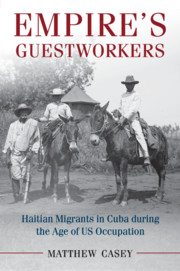Book contents
- Frontmatter
- Contents
- List of Figures, Maps, and Tables
- Acknowledgments
- Introduction
- Prologue: Experiencing the Unevenness of Empire
- 1 Making the Haitian Cuban Border and Creating Temporary Migrants
- 2 Leaving US-Occupied Haiti
- 3 Living and Working on Cuban Sugar Plantations
- 4 Picking Coffee and Building Families in Eastern Cuba
- 5 Creating Religious Communities, Serving Spirits, and Decrying Sorcery
- 6 Mobilizing Politically and Debating Race and Empire in Cuban Cities
- 7 Returning to Haiti and the Aftermath of US Occupation
- Epilogue: Enduring Legacies and Post-Colonial Divergences
- Bibliography
- Index
4 - Picking Coffee and Building Families in Eastern Cuba
Published online by Cambridge University Press: 27 April 2017
- Frontmatter
- Contents
- List of Figures, Maps, and Tables
- Acknowledgments
- Introduction
- Prologue: Experiencing the Unevenness of Empire
- 1 Making the Haitian Cuban Border and Creating Temporary Migrants
- 2 Leaving US-Occupied Haiti
- 3 Living and Working on Cuban Sugar Plantations
- 4 Picking Coffee and Building Families in Eastern Cuba
- 5 Creating Religious Communities, Serving Spirits, and Decrying Sorcery
- 6 Mobilizing Politically and Debating Race and Empire in Cuban Cities
- 7 Returning to Haiti and the Aftermath of US Occupation
- Epilogue: Enduring Legacies and Post-Colonial Divergences
- Bibliography
- Index
Summary
In the early weeks of the 1932 sugar harvest, a twenty-five-year-old Haitian named Belisario Pol was cutting cane when his machete became lodged in a thick tangle of roots. The unexpected sticking of his knife was enough to throw off his cutting rhythm. With his momentum disoriented, Pol sliced the thumb on his left hand so badly that he missed thirty-five days of work at the worst possible time – during the height of the sugar harvest. In accordance with the law, the Compañía Azucarera Fidelidad [Fidelity Sugar Company] filed a report with local authorities, provided some compensation to Pol, and collected their own share from a US-based insurance company. Exactly two months later, Pol was expected to appear in court in conjunction with the injury. But as one company guard attested he “had not been able to get the worker Belisario Pol … because he [had] left for the coffee fields of Guantánamo” eighty-five miles to the southeast; Pol's whereabouts were unknown.
The guard's inability to locate Belisario Pol is symptomatic of a larger institutional myopia that has obscured Haitians’ actions outside the Cuban sugar industry. Cuban state institutions exerted a much weaker gaze on the coffee industry than sugar, especially before the 1930s. As a result, once he left the sugar plantation, the injured worker disappears from the historical record. Despite nationalist claims that coffee was a quintessentially Cuban commodity, low production and profitability meant that neither the country's national budget nor its economic stability had depended on the crop since the early decades of the nineteenth century. The consumers in the United States who purchased so much Cuban sugar obtained their coffee elsewhere. In the first two decades of the twentieth century, both Cuba and the United States each imported millions of pounds from places throughout Latin America and the Caribbean, including Haiti. The result is a thin archival record for Cuban coffee production.
What was negligible in national or imperial terms was a matter of economic life and death for the workers and local communities who dedicated part of each year to growing coffee in Cuba. In most years, the sugar harvest began in January and ended before coffee-picking started in the fall. This seasonal difference allowed them to combine work in both industries and secure a year-round wage.
- Type
- Chapter
- Information
- Empire's GuestworkersHaitian Migrants in Cuba during the Age of US Occupation, pp. 154 - 179Publisher: Cambridge University PressPrint publication year: 2017

